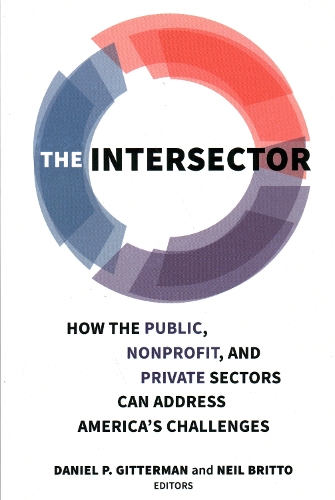
The Intersector: How the Public, Nonprofit, and Private Sectors Can Address America's Challenges
(Paperback)
Publishing Details
The Intersector: How the Public, Nonprofit, and Private Sectors Can Address America's Challenges
By (Author) Daniel P. Gitterman
Edited by Neil Britto
Bloomsbury Publishing PLC
Brookings Institution
8th June 2021
United States
Classifications
Professional and Scholarly
Non Fiction
Political science and theory
Economics
Social services and welfare, criminology
Physical Properties
Paperback
305
Width 154mm, Height 224mm, Spine 23mm
481g
Description
Exploring how cross-sector collaboration can solve seemingly intractable societal problems
Many people tend to think of the public, non-profit and private sectors as being distinctive components of the economy and broader societyeach with its own missions and problems to address. This book describes how the three sectors can work together toward common purposes, accomplishing much more than if they work alone.
With the nation reeling from multiple challenges, more than ever the United States needs these sectors to collaborate to address what might seem to be intractable problems. Cross-sector collaborations and partnerships are more crucial than in the past as the country tries to recover from the economic, health, and broad social dislocations caused by the COVID-19 pandemic. At a time when trust in institutions, both public and private, is at an all-time low, cooperation among the sectors can be a confidence-inspiring approach to addressing public problems.
This book reviews the state of cross-sector collaborations, identifies emerging practices, and offers a range of perspectives from experts in the field. Practitioners show how cooperation among sectors is relevant to their core missions. Scholars from a wide range of disciplines discuss both the broad and specific concepts that advance understanding of cross-sector collaboration.
At a time when the United States must recover from and address new challenges, the book shows how cross-sector collaborations can help ensure a brighter future. Its core conclusions should be of particular interest to leaders in each of the broad sectors, as well as educators and students at both the undergraduate and graduate level.
Reviews
Our country faces daunting problems that cannot be solved by one sector alone. The pandemic, the economic contraction, climate change, and the disproportionate impacts of each on communities of color are among the challenges that require an all-of-society response. By offering a vision of 'intersector' solutions, this volume shows how to build trust among actors in the public, private, and nonprofit sectors, and forge alliances that allow us to manage shared dangers, steward shared resources, and show that our democracy can work if we work it.
Jane Wales, vice president and executive director of the Program on Philanthropy and Social Innovation, Aspen Institute;
To facilitate an intersectoral approach as a method for addressing public problems, we need new forms of expertise, accountability, and information. . . . This book will give a new generation of leaders the knowledge and tools to make a difference in andfor our public life through cross-sector collaboration.
Bill Haslam, former governor of Tennessee (20112019) and chair of the board of trustees of the Wilson Center;
As the contributors to this volume make clear, by working together and establishing the mutual respect needed to trust each other, public, private, and nonprofit sector leaders can solve many of the nation's problems. The possibilities for public goodemerging from such collaborations are almost limitless.
Erskine Bowles, former White House chief of staff (19961998) and president of the University of North Carolina System (20062011)
Author Bio
Daniel P. Gitterman is Duncan MacRae '09 and Rebecca Kyle MacRae Professor and Chair of Public Policy at the University of North Carolina at Chapel Hill. He is a Senior Advisor to The Intersector Project at the Aspen Institute's Program on Philanthropy and Social Innovation.Neil Britto was Executive Director and Co-Founder of The Intersector Project, now an initiative of the Aspen Institute's Program on Philanthropy and Social Innovation where he serves as Project Lead. He is an Adjunct Professor at New York University's Wagner School of Public Service and has advised foundations, companies, and governments on cross-sector collaboration.
